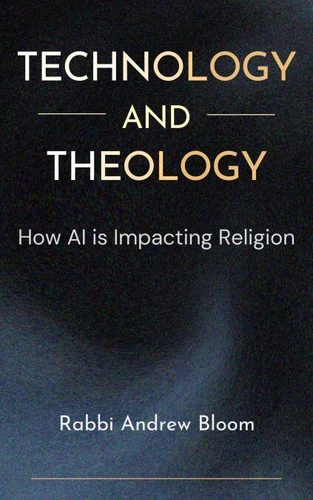Technology and Theology: How AI is Impacting Religion
Par :Formats :
Disponible dans votre compte client Decitre ou Furet du Nord dès validation de votre commande. Le format ePub est :
- Compatible avec une lecture sur My Vivlio (smartphone, tablette, ordinateur)
- Compatible avec une lecture sur liseuses Vivlio
- Pour les liseuses autres que Vivlio, vous devez utiliser le logiciel Adobe Digital Edition. Non compatible avec la lecture sur les liseuses Kindle, Remarkable et Sony
 , qui est-ce ?
, qui est-ce ?Notre partenaire de plateforme de lecture numérique où vous retrouverez l'ensemble de vos ebooks gratuitement
Pour en savoir plus sur nos ebooks, consultez notre aide en ligne ici
- FormatePub
- ISBN8991958806
- EAN9798991958806
- Date de parution25/11/2024
- Protection num.pas de protection
- Infos supplémentairesepub
- ÉditeurAndrew Bloom
Résumé
Technology and Theology: How AI is Impacting Religion explores the intersection of ancient religious wisdom and modern AI, focusing on how they shape our moral and social landscape. Written by a Conservative Rabbi and AI ethicist, it addresses theological questions-like free will, human uniqueness, and moral responsibility-through Jewish concepts such as B'tzelem Elohim (Image of God) and Tikkun Olam (repairing the world) while drawing insights from other faiths.
The book examines AI's influence on worship, education, social justice, privacy, governance, and work, offering ethical frameworks for responsible use. Emphasizing that AI reflects the values of its creators, it encourages balancing innovation with justice, humility, and community. Rather than viewing AI as a threat, it invites religious communities to embrace it as an opportunity.
The book examines AI's influence on worship, education, social justice, privacy, governance, and work, offering ethical frameworks for responsible use. Emphasizing that AI reflects the values of its creators, it encourages balancing innovation with justice, humility, and community. Rather than viewing AI as a threat, it invites religious communities to embrace it as an opportunity.
Technology and Theology: How AI is Impacting Religion explores the intersection of ancient religious wisdom and modern AI, focusing on how they shape our moral and social landscape. Written by a Conservative Rabbi and AI ethicist, it addresses theological questions-like free will, human uniqueness, and moral responsibility-through Jewish concepts such as B'tzelem Elohim (Image of God) and Tikkun Olam (repairing the world) while drawing insights from other faiths.
The book examines AI's influence on worship, education, social justice, privacy, governance, and work, offering ethical frameworks for responsible use. Emphasizing that AI reflects the values of its creators, it encourages balancing innovation with justice, humility, and community. Rather than viewing AI as a threat, it invites religious communities to embrace it as an opportunity.
The book examines AI's influence on worship, education, social justice, privacy, governance, and work, offering ethical frameworks for responsible use. Emphasizing that AI reflects the values of its creators, it encourages balancing innovation with justice, humility, and community. Rather than viewing AI as a threat, it invites religious communities to embrace it as an opportunity.



